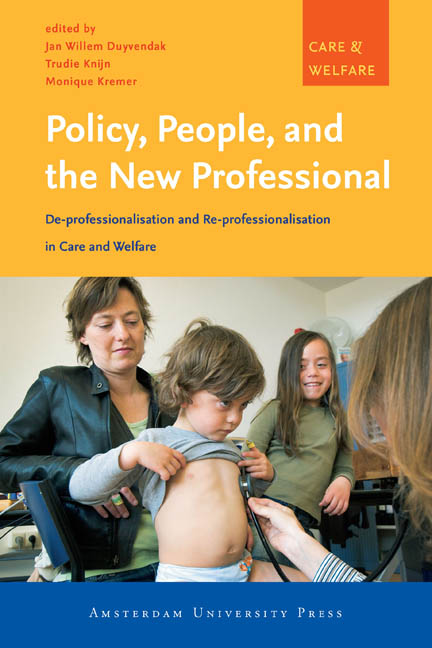 Policy, People, and the New Professional
Policy, People, and the New Professional 7 - When Diversity Matters
Published online by Cambridge University Press: 23 January 2021
Summary
Lately I have had a lot of Turkish clients, a lot of Turkish women… and that is strenuous in a completely different way than working with Dutch women. There is a very big difference indeed… I think because of culture… there are many stress complaints and also little self-reflection, at least with the women I have seen up till now.
(Interview with social worker, 7 October 2003)Introduction
Human service organisations are confronted with a culturally plural clientele. This study intends to unravel the everyday practices of social workers in dealing with cultural diversity. Assuming diversity has an impact on both the general repertoire and the everyday work of professionals, the question of this chapter is: How do professionals deal with diversity? I will focus mainly on what social workers experience in the providing of social services to a culturally diversified clientele: How do social workers talk about cultural diversity and how do they relate these issues to their professional attitude and competence in their own words?
Following Hall, Sarangi and Slembrouck (1997; 1999), I will describe the professional activity of social workers as a discourse practice. Accordingly, I assume that social work practices do relate to ‘general’ or ‘societal’ discourses (Foucault in Blommaert & Bulcaen 2000) provided by society at large, by the profession or by the organisation at hand. Furthermore, I assume that their everyday interactions on the work floor are influenced by these general discourses, however much these local interactions should also be seen as local discourses in the sense of local ‘processes of mutual sense-making’ on their own behalf. Accordingly, I intend to demonstrate how in the interview accounts perceptions on ‘culture’ are, at least partly, framed by the focus on individualisation and empowerment that appears to dominate the current social work discourse.
Dealing with Migrants in the Social Sector
In the Netherlands, roughly half a million people (about 3% of the Dutch population) contact the social services office annually (VWS 2004). Of those contacting a social worker, the percentage of clients with a country of origin other than the Netherlands fluctuated from 16% in 2000 to 23% in 2002 (NIVEL 2004: 134). These data largely correspond with those of the studied organisation.
- Type
- Chapter
- Information
- Policy, People, and the New ProfessionalDe-professionalisation and Re-professionalisation in Care and Welfare, pp. 97 - 108Publisher: Amsterdam University PressPrint publication year: 2006
- 1
- Cited by
